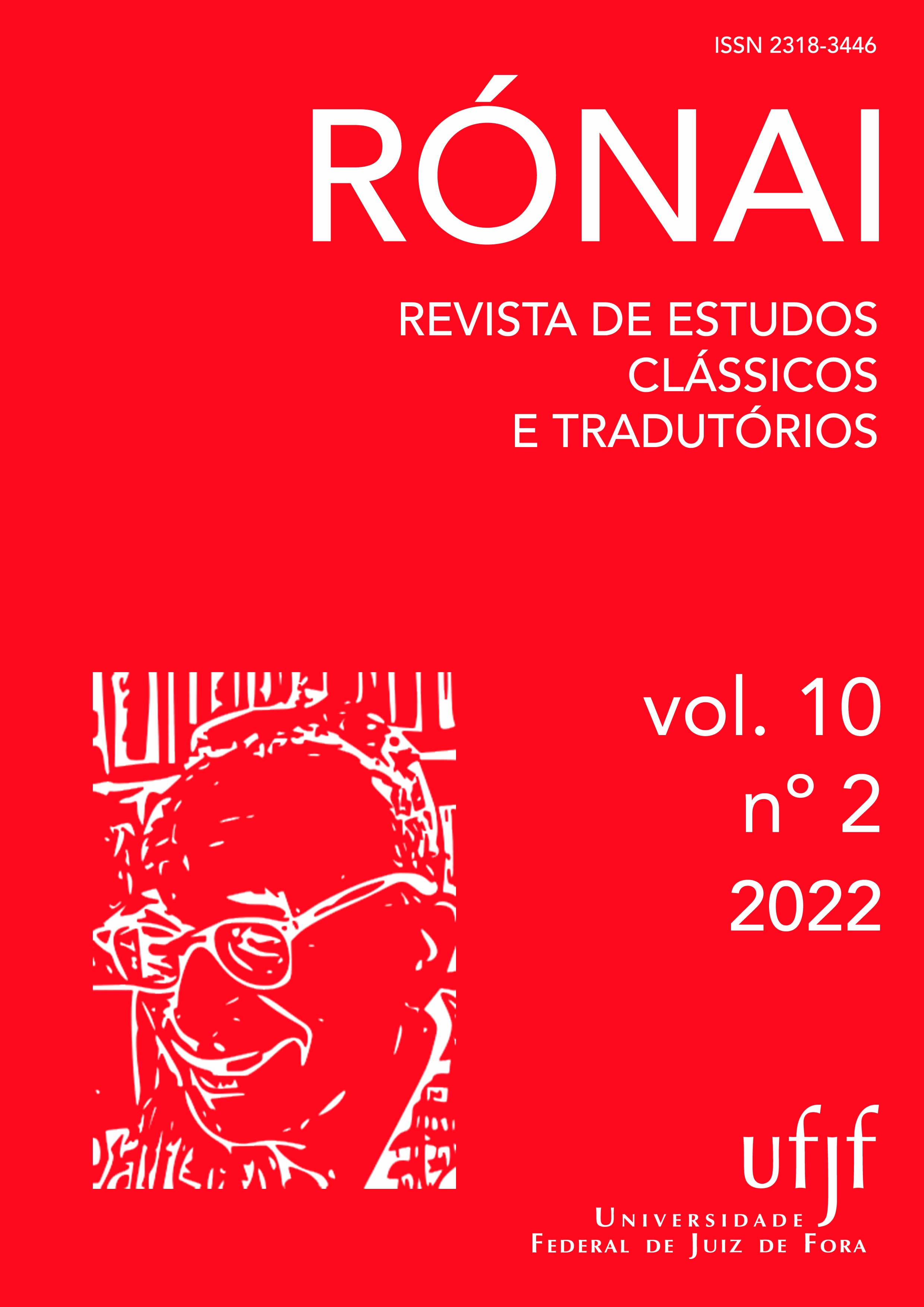The constitution of the poetic persona in Juvenal
DOI:
https://doi.org/10.34019/2318-3446.2022.v10.38448Keywords:
Juvenal, Roman satire, poetic persona, satyrical ethosAbstract
We analyse the self-image constructed by the poetic persona in the works of the Roman satirist Juvenal, constituted by sixteen poems. The use of the concept of poetic persona was first suggested by William Anderson (1982), whose goal was to give back the artistic character to satyrical texts, which, at that point, were read only as biographical sources for their authors. Our analysis takes into account the definition of discursive ethos as posed by Dominique Maingueneau (2010), who affirms that there is an elaboration of self-image whenever a speaker speaks. Therefore we analyse how the voice in Juvenal’s poems presents itself. We followed the method of content analysis as established by Laurence Bardin (2006) and our results are organized into four main categories: a) the self-image of the satirist; b) the damnation of wealthiness; c) thoughts on women, and d) description of a society in decay.
Downloads
References
ANDERSON, William. Essays on Roman Satire. Princeton: Princeton University, 1982.
ARMSTRONG, David. Juvenalis Eques: A Dissident Voice From The Lower Tier of the Roman Elite. In: BRAUND, Susanna;
OSGOOD, Josiah. A Companion to Persius and Juvenal. Malden: Blackwell, 2012. p. 59-78.
BARDIN, Laurence. Análise de conteúdo. Tradução: Luís Antero Reto e Augusto Pinheiro. Lisboa: Edições 70, 2006.
BRAUND, Susanna. Introduction. In: JUVENAL; PERSIUS. Juvenal and Persius. Edited and translated by Susanna Morton Braund. Cambridge: Harvard University, 2004. p. 1-39.
CARMO, Rafael Cavalcanti do. Difficile est saturam bene vertere: os desafios da tradução poética e uma versão brasileira das Sátiras de Juvenal. 2018. 291 f. Tese (Doutorado em Letras) – Programa de Pós-Graduação em Letras, Universidade Federal do Espírito Santo, Vitória. 2018.
CASTRO, Marihá Barbosa e. O programa satírico de Pérsio frente à tradição. 2015. 146 f. Dissertação (Mestrado) - Programa de Pós-graduação em Letras, Universidade Federal do Espírito Santo, Vitória, 2015.
CORDEIRO, Iana Lima. A construção da persona satíricana obra de Juvenal. 2019. 127 f. Dissertação (Mestrado) – Programa de Pós-Graduação em Letras Universidade Federal do Espírito Santo, Vitória, 2019.
CURTIUS, Ernst Robert. Literatura europeia e idade média latina. Brasília: Instituto Nacional do Livro, 1979.
GRIMAL, Pierre. Dicionário da mitologia grega e romana. Tradução de Victor Jabouille. 5. edição. Rio de Janeiro: Bertrand Brasil, 2005.
HIGHET, Gilbert. Juvenal the Satirist: a Study. New York: Oxford University, 1954.
HORÁCIO. Sátiras. Tradução de Antônio Luís Seabra. São Paulo: Edipro, 2011.
JUVENAL. Juvenal and Persius. Edited and translated by Susanna Morton Braund. Cambridge: Harvard University, 2004.
LEITE, Leni Ribeiro; CORDEIRO, Iana Lima. A construção da persona na sátira 6 de Juvenal. Classica, e-ISSN 2176-6436, v. 31, n. 2, p. 89-100, 2018.
LEITE, Leni Ribeiro; CORDEIRO, Iana Lima. A construção satírica no livro I de Juvenal. Calíope: Presença Clássica, ano XXXIV, n. 33, p. 5-25, 2017.
MAINGUENEAU, Dominique. Doze conceitos em Análise do Discurso. São Paulo: Parábola, 2010.
PLAZA, Maria. The Function of Humour in Verse Satire: Laughing and Lying. New York: Oxford University, 2006.
VITORINO, Mônica Costa. Juvenal: o satírico indignado. Belo Horizonte: UFMG, 2003.
Downloads
Published
How to Cite
Issue
Section
License
Copyright (c) 2022 Iana Lima Cordeiro

This work is licensed under a Creative Commons Attribution 4.0 International License.
Copyright
The authors of the published contributions agree with the following items:
1. The authors keep the copyright and convey to the journal the right of first publication, the work being licensed under a Creative Commons Attribution License 4.0 International.
2. The authors are allowed and stimulated to publicize and distribute their work online after the publication in the journal, recognizing first publication in this journal.
3. The authors of the approved works authorize the journal to distribute their content, after publication, for reproduction in content indexes, virtual libraries and similars.
For more information about Creative Commons Attribution License 4.0 International, please, go to: https://creativecommons.org/licenses/by/4.0/deed.en
Editorial exemption
The authors of the published contributions are entirely and exclusively responsible for their contents. Its content does not represent an official position of Rónai - Revista de Estudos Clássicos e Tradutórios neither of Faculdade de Letras da Universidade Federal de Juiz de Fora or their partner institutions.



